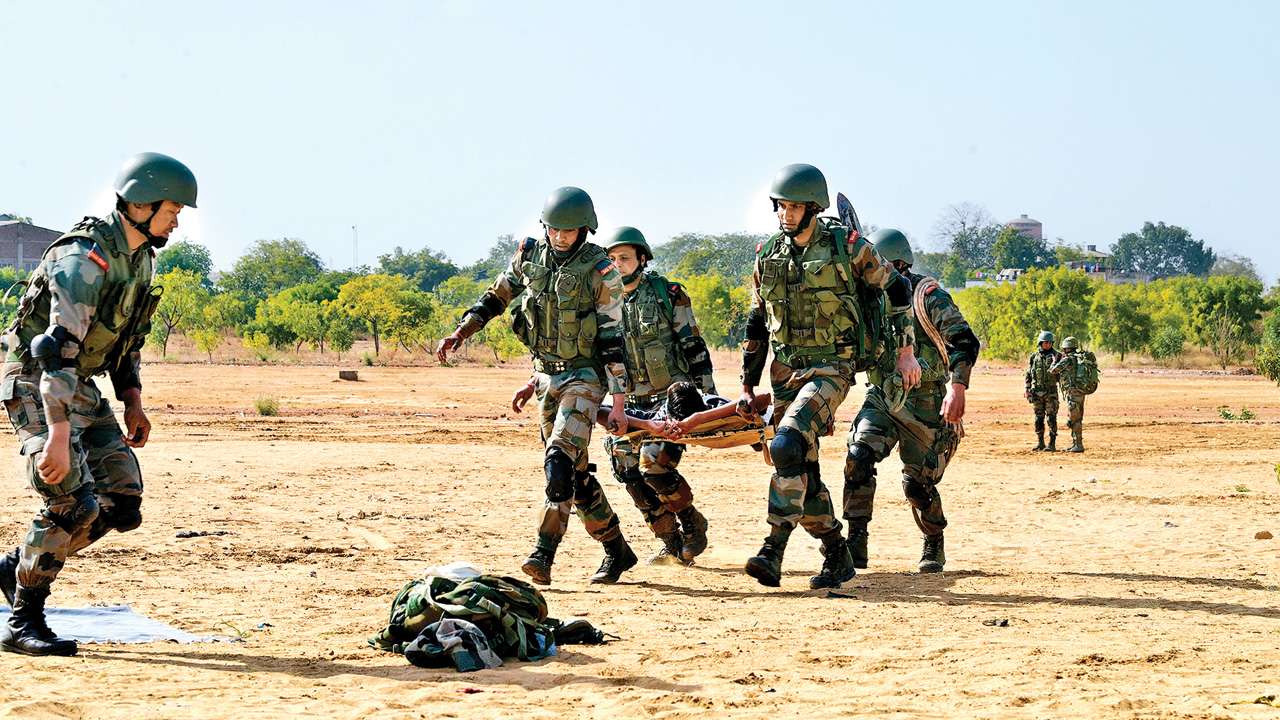
AK Das, a Central Reserve Police Force head constable posted in Kashmir, committed suicide by shooting himself with his service rifle. In a similar outrage, an army personnel pumped five bullets into Major Shikhar Thappa. The officer had pulled up the soldier for using a mobile phone while on duty.
Media reports are heart-wrenching, but point to the unease among the ranks of fighting soldiers, sadly swept under the carpet by authorities.
Love of a life in the armed forces and in uniform is the overwhelming reason for a young man to join the army or the defence forces. When confronting the enemy, he obeys the orders of his company commander, ever-ready to lay down his life for the country and for regimental pride.
But he is in a state of perpetual distress by the war that rages in his backyard, his home. Although away from his family, he gets daily updates on mobile phone, on social media. Every bad news from home sends him into an invisible depression. His frequent visits to his home and family to settle disputes are unsuccessful. And each time he returns to his post without resolving unending issues, personal or professional, his distress mounts.
When on leave, he overstays against regimental rules. Warnings from his company commander to report on time aggravate his distress. Without going into a soldier’s stress, the company commander, many of them kind and reasonable, reject the frequent demand for leave.
Torn between the two wars, the soldier has little choice. This story repeats itself for the thousands who serve in the army and paramilitary forces. Recruited from villages, they carry with them the burden of their homes to their frontier posts.
The many personal disputes that dominate their lives take them to police stations, tehsildar courts, revenue and criminal courts. The arms-bearing soldier of the Indian Army, the brave fighter, stands with folded hands at every court and police station. His pride is crushed, his resolve to fight for the nation weakened and faith in the society shaken.
These issues may be laughable for a city dweller or one from the newly educated generation, but they dominate the villages from where the bulk of our armed forces are recruited.
Disputes arise every day and remain unresolved as a soldier cannot handle them. Neither he nor his family is trained for handling such stress.
Most soldiers stay away from home for 10 to 11 months a year, which ultimately leads to marital discords, allegations and counter allegations. When issues aggravate, they result in the extreme step of taking a life.
Suicide and fratricide are not uncommon in the paramilitary and army forces deployed in Kashmir. The number of defence personnel committing suicide is the highest in the Indian Army.
According to ministry of defence and statements made in Parliament, in 2018, as many as 80 army personnel are believed to have committed suicide. This number is 16 for the Indian Air Force (IAF) and eight for the Navy.
In 2017 the number of army personnel who are suspected to have committed suicide was 75, while in 2016 this figure stood at 104.
In the IAF, the number of suspected suicides was 21 in 2017 and 19 in 2016. For the Navy, these numbers stood at five and six for 2017 and 2016, respectively.
There is another aside. The impact on the morale of soldiers is enormous, which is reflected in a large number of them seeking retirement.
Official figures say that the rate of voluntary retirement is the highest in the army, with 412 officers opting for VRS in 2018, their numbers rising from 353 in 2016. This certainly does not bode well for the army, which is already suffering from a shortfall of officers.
Not surprisingly, most of them chose VRS for ‘domestic and personal reasons’. It is time to revisit the personnel policy of the forces when these ‘domestic and personal reasons’ become more important for a soldier than his duty on the border.
Who could solve their problems? The company commander, commandant of the battalion, the village sarpanch or their fellow soldiers? But they cannot do it individually. What is needed is a re-education programme for soldiers. Sensitisation of district and village authorities could prove to be ideal solutions.
Village panchayats and Sainik Kalyan Boards need to be proactive and should be sensitised.
The Union home minister said in Parliament that various steps have been taken by the armed forces to create a healthy environment for their officers and other ranks.
Besides other measures, mental health awareness is provided during pre-induction training. Distress management has been institutionalised to reduce stress among troops. A helpline has also been established by the army and the air force to provide professional counselling. The army and armed forces are upbeat with training and stress management projects, but the numbers of suicides and of those seeking voluntary retirement are on the rise. Much more needs to be done.
The onus of preventing the mental stress of a soldier lies with his regimental authorities; a company commander is closest to his soldier. He is mother and father and should behave accordingly. By getting involved in his troop’s personal problems, he can evoke love and respect – a must when he has to ask his men to risk their lives in a war-like situation.
The author is a retired IPS officer from Rajasthan, with vast experience of commanding an armed battalion